



StrideBloods: Comprehensive blood testing for optimal health
Test 70+ blood biomarkers to reveal your complete health profile. Unlock critical insights into your heart health, hormone balance, nutrient levels, fertility, organ functions, methylation efficiency, and longevity markers. Track results over time for long-term, optimised health.
- At-home, professional phlebotomy service (UK only)
- Results in 7 business days
- Subscribe and save 30% when you sign up to re-test in 6 months
At-home phlebotomy service
Fast results in 7 days
Clear, actionable results
Track results over time
How StrideBloods works
Understanding your health has never been easier. StrideBloods takes you from booking your home blood test to actionable insights in a few simple steps.
1

Book at-home blood test
Select your test and book your blood draw with our UK phlebotomy network.
2

Conduct test and sample to lab
Following a professional at home blood test, your sample is analysed at our accredited lab.
3

Receive results and optimise
Within 7 days, access your clear results through MyStride, our secure digital platform.
4

Re-test and measure progress
See how your biomarkers improve as you implement our lifestyle optimisation recommendations.
Why blood testing for health?
Your body is unique—unlike anyone else's. Generic health advice fails because it ignores your individual biochemistry.
Blood testing reveals your current health status through precise biomarker measurements, showing exactly what your body needs right now. This allows you to make targeted health decisions based on evidence, not guesswork.
Stop following one-size-fits-all advice that wasn't designed for your specific nutritional requirements, hormonal balance, and metabolic patterns.

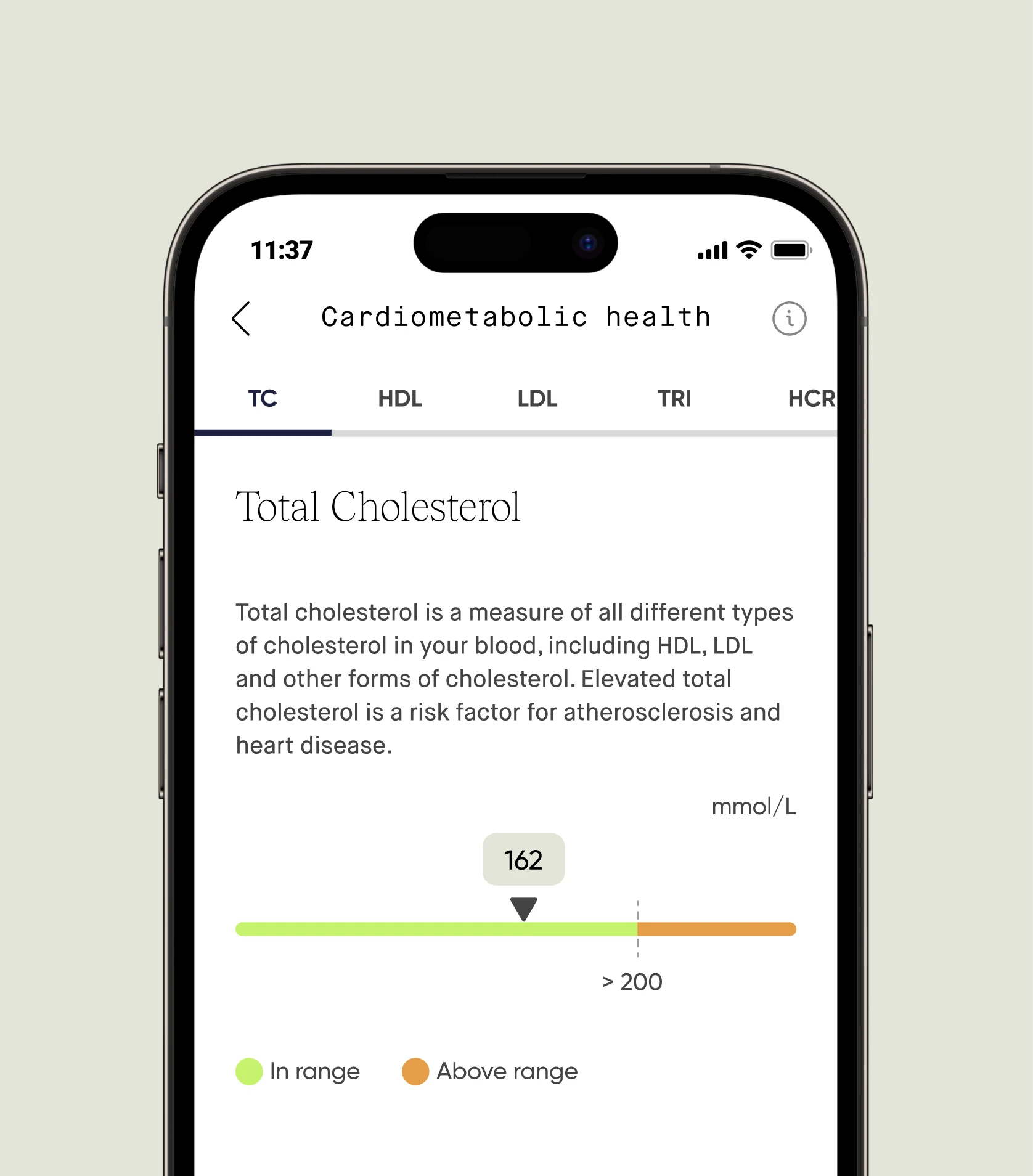
Why StrideBloods?
Complete Health Analysis: Comprehensive insights into your heart health, hormone balance, nutritional status, fertility, organ function, and methylation and longevity markers.
Nationwide Professional Phlebotomy Service: Our trained phlebotomists come to your home or office anywhere in the country, providing comfortable, professional blood draws that are more accurate than finger-prick tests.
Personalised Actionable Insights: Detailed analysis of 70+ biomarkers with clear results and recommendations.
Track Your Progress: Regular testing shows how your body responds to recommended changes, creating a dynamic picture of your improving health over time.
Buy StrideBloods TestWhat's included with StrideBloods?
With StrideBloods, we analyse 70+ essential biomarkers via an at-home blood test. We focus on the most clinically relevant health indicators that influence whole-body health and wellbeing.
Cardiometabolic Health Markers
The Cardiometabolic panel examines key indicators that provide insight into your heart, vascular and metabolic health status. These markers help identify potential risk factors for heart disease, stroke, and diabetes before symptoms develop, allowing for early intervention.
Armed with this data, you can make targeted decisions about diet, exercise, and lifestyle modifications to support optimal cardiovascular function and reduce health risks.
Apolipoprotein A1
The main protein component of HDL particles.
Why measure? Provides more detailed information about your HDL particles' quality and function beyond just HDL cholesterol levels.
Apolipoprotein B
The main protein found in LDL and other atherogenic lipoprotein particles.
Why measure? Offers a more accurate assessment of cardiovascular risk than standard lipid tests, as it reflects the actual number of potentially harmful particles.
Apolipoprotein B/A1 Ratio
The balance between potentially harmful and protective cholesterol carriers.
Why measure? This ratio is considered one of the strongest predictors of heart disease risk, offering more precise insights than standard cholesterol testing.
hsCRP (High-sensitivity C-reactive protein)
Measures low-level inflammation in your body.
Why measure? Inflammation plays a central role in heart disease development. Elevated levels indicate increased cardiovascular risk even when cholesterol levels appear normal.
HbA1c
Measures your average blood glucose over the past 2-3 months.
Why measure? Provides insight into long-term glucose control, helping identify pre-diabetes and diabetes risk, which may significantly increase cardiovascular disease risk.
HDL Cholesterol
Measures "good" cholesterol that helps remove other forms of cholesterol from your bloodstream.
Why measure? Higher levels of HDL are protective against heart disease, while low levels indicate cardiovascular disease risk.
HDL % of Total Cholesterol
Measures the percentage of your total cholesterol that is HDL.
Why measure? This ratio helps evaluate the balance between protective and harmful cholesterol types in your blood.
LDL Cholesterol
Measures "bad" cholesterol that can build up in your arteries.
Why measure? LDL is a primary driver of atherosclerosis (plaque build up in arteries) and cardiovascular disease risk, making it a key target for heart disease prevention.
Lipoprotein (a)
A specialised type of LDL particle with genetic determinants.
Why measure? Elevated Lp(a) significantly increases cardiovascular risk independent of other factors and doesn't respond to traditional cholesterol-lowering approaches.
Non-HDL Cholesterol
Measures all cholesterol types except HDL.
Why measure? Provides a more comprehensive assessment of cardiovascular risk than LDL alone and is a risk marker for dyslipidemia and metabolic syndrome.
Random Glucose
Measures your blood sugar levels at time of testing.
Why measure? Helps assess your current glucose regulation and screen for potential metabolic issues that could affect heart health and diabetes risk.
Total Cholesterol
Measures the total cholesterol level in your blood.
Why measure? Elevated total cholesterol is a risk factor for atherosclerosis and heart disease.
Triglycerides
Measures levels of this type of fat in your blood.
Why measure? High triglycerides are linked to increased risk of heart disease and can indicate metabolic issues including insulin resistance.
See More
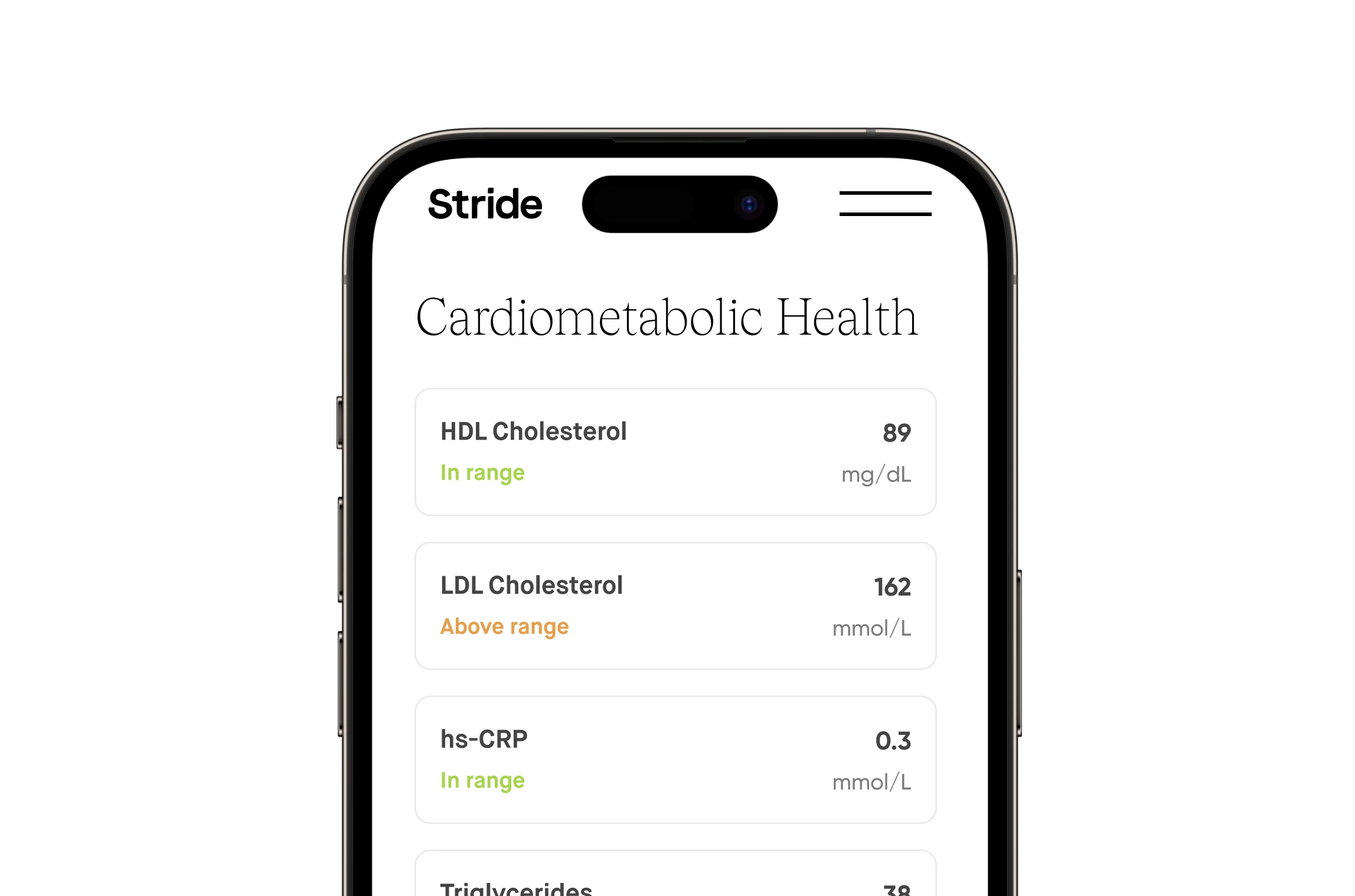
Hormone Health Markers
The Hormone panel analyses critical hormone levels that regulate numerous bodily functions from metabolism and energy production to reproductive health and mood regulation. Hormone imbalances can impact virtually every aspect of your health and wellbeing.
Regular hormone testing allows you to identify imbalances early and track how lifestyle modifications, stress management, or therapeutic interventions affect your hormonal health.
Anti-TG (Thyroglobulin Antibodies)
Antibodies targeting thyroglobulin, a protein essential for thyroid hormone production.
Why measure? Detects autoimmune thyroid conditions like Hashimoto's thyroiditis, often before thyroid hormone levels change.
Cortisol
The primary stress hormone produced by the adrenal glands.
Why measure? Helps assess adrenal function and stress response, with implications for energy, immunity, and metabolic health.
D.H.E.A. Sulphate (DHEAS)
An adrenal hormone that serves as a precursor to sex hormones.
Why measure? Assesses adrenal function and can indicate stress response capacity, with implications for energy, immunity, and ageing.
Free Androgen Index (FAI)
Measures the ratio of total testosterone to sex hormone binding globulin.
Why measure? Provides an estimate of biologically available testosterone, helping identify subtle hormonal imbalances that might be missed when looking at individual hormone measurements alone.
FT3 (Free Triiodothyronine)
The unbound, biologically active form of T3, the most potent thyroid hormone.
Why measure? Provides the most direct indicator of thyroid hormone activity at the cellular level, crucial for assessing metabolic function and thyroid status in complex cases.
FT4 (Free Thyroxine)
The unbound, biologically active form of thyroxine (T4) that's available for tissues to use.
Why measure? Provides a more accurate assessment of thyroid function than total T4, helping diagnose hypo/hyperthyroidism and monitor thyroid treatment effectiveness.
Luteinising Hormone (LH)
A pituitary hormone that works with FSH to regulate reproductive function.
Why measure? In women, helps monitor ovulation; in men, it stimulates testosterone production. Abnormal levels can indicate issues with reproductive health or pituitary function.
Oestradiol
The primary female sex hormone, present in both women and men.
Why measure? Helps assess reproductive function, bone health, and metabolic status. Imbalances can affect mood, energy, weight, and sexual function.
Progesterone
A reproductive hormone essential for menstrual cycle regulation and pregnancy.
Why measure? Helps evaluate menstrual irregularities, fertility issues, and hormonal balance. Adequate progesterone is crucial for mood stability and healthy menstrual function.
Prolactin
A hormone primarily responsible for milk production in women.
Why measure? Abnormal levels can affect reproductive function, libido, and may indicate pituitary issues.
Sex Hormone Binding Globulin (SHBG)
A protein that binds to sex hormones, regulating their availability.
Why measure? Levels are affected by factors including liver function, thyroid health, and insulin levels, making this an important marker for overall hormonal balance.
T4 (Thyroxine)
The main hormone produced by the thyroid gland.
Why measure? Helps evaluate thyroid function and identify potential thyroid disorders that can affect virtually all body systems.
Testosterone
A hormone important for muscle mass, bone density, energy levels, and libido in both men and women.
Why measure? Helps identify imbalances that may affect energy, mood, and physical performance, and monitors age-related decline.
TPO Antibodies
Antibodies that target thyroid peroxidase, an enzyme in the thyroid.
Why measure? Helps identify autoimmune thyroid conditions like Hashimoto's thyroiditis before thyroid function is significantly affected.
TSH (Thyroid Stimulating Hormone)
A pituitary hormone that regulates thyroid function.
Why measure? Helps assess thyroid health, with abnormal levels potentially indicating hypothyroidism or hyperthyroidism affecting metabolism, energy, and overall wellbeing.
See More
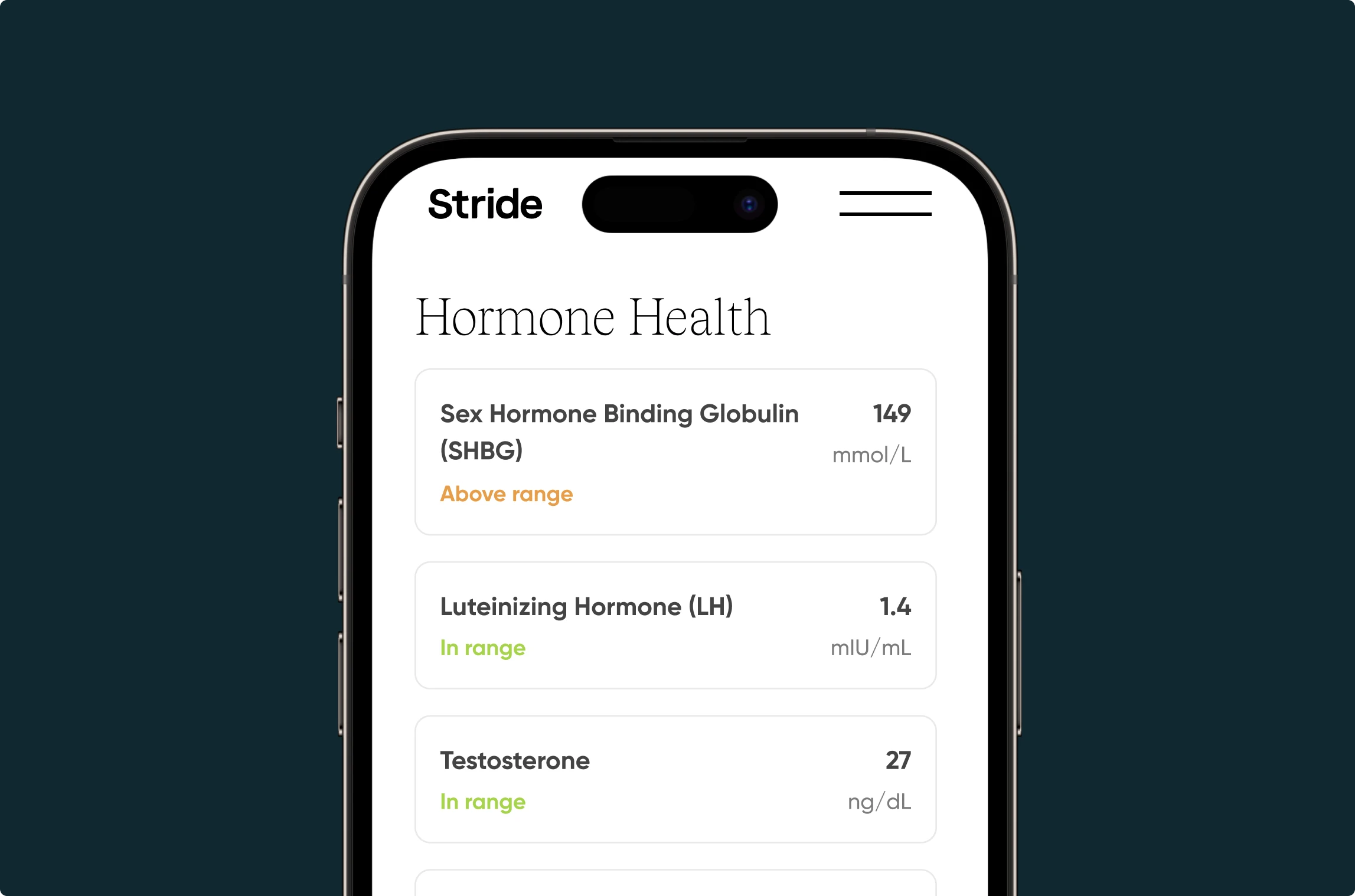
Nutritional Status Markers
The Nutrient panel examines essential vitamin and mineral levels that are crucial for optimal physiological function. Nutritional deficiencies can impact everything from energy production to immune function, often with subtle symptoms that go unrecognised.
Understanding your nutrient status allows you to implement targeted supplementation and dietary changes based on your actual biochemistry rather than generic recommendations.
Active B12
The biologically active form of vitamin B12 that your body can utilise.
Why measure? Essential for energy production, neurological function, and DNA synthesis. Deficiency can cause fatigue and cognitive issues.
Calcium
A mineral essential for bone health, muscle function, and nerve signalling.
Why measure? Abnormal levels can impact bone health, cardiovascular function, and neuromuscular activity.
Chloride
An electrolyte that works with sodium to maintain fluid balance.
Why measure? Helps assess hydration status and acid-base balance in the body.
Ferritin
Measures your body's iron stores.
Why measure? Helps assess both iron deficiency and overload, which can affect energy levels, immune function, and overall health.
Folate (Vitamin B9)
Circulating levels of folate (Vitamin B9), essential for numerous biochemical reactions, including DNA synthesis, red blood cell production, and preventing neural tube birth defects.
Why measure? Crucial for DNA synthesis, cellular division, and methylation processes. Optimal levels support cardiovascular health and cognitive function.
Iron
The amount of iron circulating in your blood.
Why measure? Iron is essential for oxygen transport and energy production. Testing helps identify deficiency which can cause fatigue and reduced performance.
Magnesium
A mineral involved in hundreds of biochemical reactions in the body.
Why measure? Deficiency is common and can affect energy production, muscle function, and cardiovascular health.
Sodium
An essential electrolyte that helps regulate fluid balance.
Why measure? Abnormal levels can indicate dehydration, kidney issues, or hormonal imbalances.
Transferrin Saturation
The percentage of transferrin that is saturated with iron.
Why measure? Provides insights into iron availability and helps identify both deficiency and overload conditions.
Total Iron Binding Capacity (TIBC)
The blood's capacity to bind iron with transferrin.
Why measure? Helps evaluate iron status and distinguish between different causes of anaemia.
Unsaturated Iron Binding Capacity (UIBC)
The amount of transferrin that is not carrying iron.
Why measure? Complements other iron tests to provide a complete picture of iron metabolism and availability.
Vitamin D
Circulating levels of vitamin D, which functions more like a hormone in the body.
Why measure? Deficiency is extremely common and linked to immune dysfunction, bone loss, mood disorders, and increased disease risk.
See More
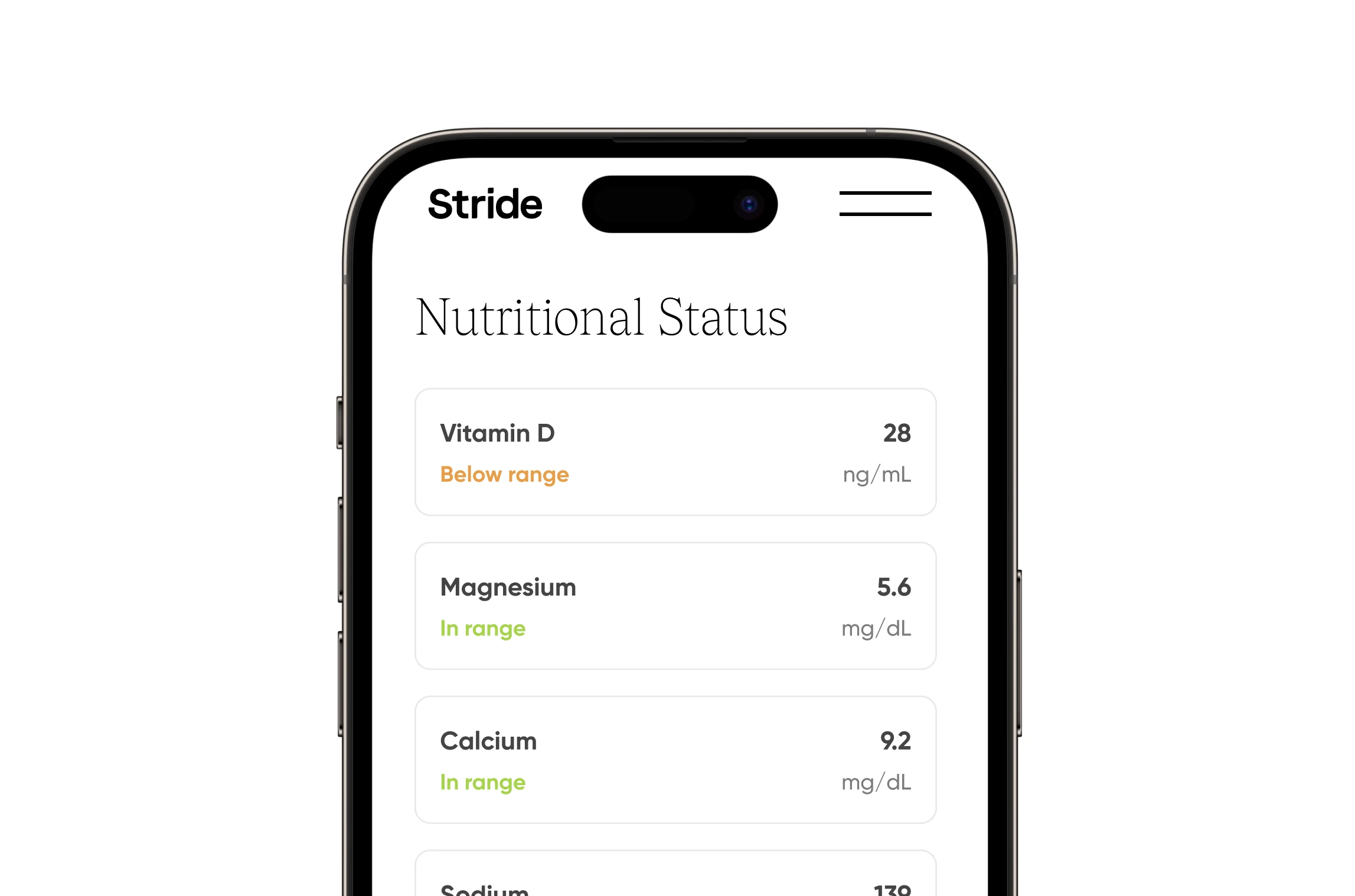
Vital Organs Function Markers
The Vital Organ Function panel examines essential markers that reflect the health and performance of your liver and kidneys - two organs critical for detoxification, metabolism, and overall wellbeing. These markers help identify potential issues before symptoms develop, allowing for early intervention and support.
Armed with these insights, you can make informed decisions about your lifestyle, nutrition, and hydration to support optimal organ function and protect these vital systems long-term.
Alanine Transferase (ALT)
An enzyme primarily found in liver cells.
Why measure? Elevated levels can indicate liver damage or disease, allowing for early intervention before symptoms develop.
Albumin
The most abundant protein in blood, produced by the liver, important for maintaining blood volume and pressure.
Why measure? Serves as a marker of protein status, nutritional health, and liver function.
Alkaline Phosphatase (ALP)
An enzyme found in liver, bile ducts, and bone.
Why measure? Helps evaluate liver and bone health, with elevated levels potentially indicating liver or bone disorders.
Aspartate Transferase (AST)
An enzyme found in the liver, heart, and muscles.
Why measure? Elevated levels can indicate damage to these tissues, especially when considered alongside other liver enzymes.
Bilirubin
A breakdown product of red blood cells processed by the liver.
Why measure? Elevated levels can indicate liver dysfunction or increased red blood cell breakdown.
Creatinine
A waste product filtered by the kidneys.
Why measure? Measures kidney function, which may be affected by high blood pressure and diabetes, and filtration capacity, essential for overall health.
eGFR (estimated Glomerular Filtration Rate)
An estimate of how well your kidneys are filtering blood.
Why measure? Provides a more precise assessment of kidney function than creatinine alone, helping identify decline in kidney function early.
Gamma GT (GGT)
An enzyme primarily found in the liver and bile ducts.
Why measure? Sensitive indicator of liver disease, bile duct issues, or alcohol consumption patterns.
Globulin
A group of proteins in the blood, including antibodies.
Why measure? Helps assess immune function and protein status, with abnormal levels potentially indicating infection or immune disorders.
Total Protein
All proteins found in the liquid part of your blood.
Why measure? Provides information about nutritional status, bone health, liver function, and immune system health.
Urea
A waste product formed from protein breakdown and filtered by the kidneys.
Why measure? Provides information about kidney function and protein metabolism.
See More
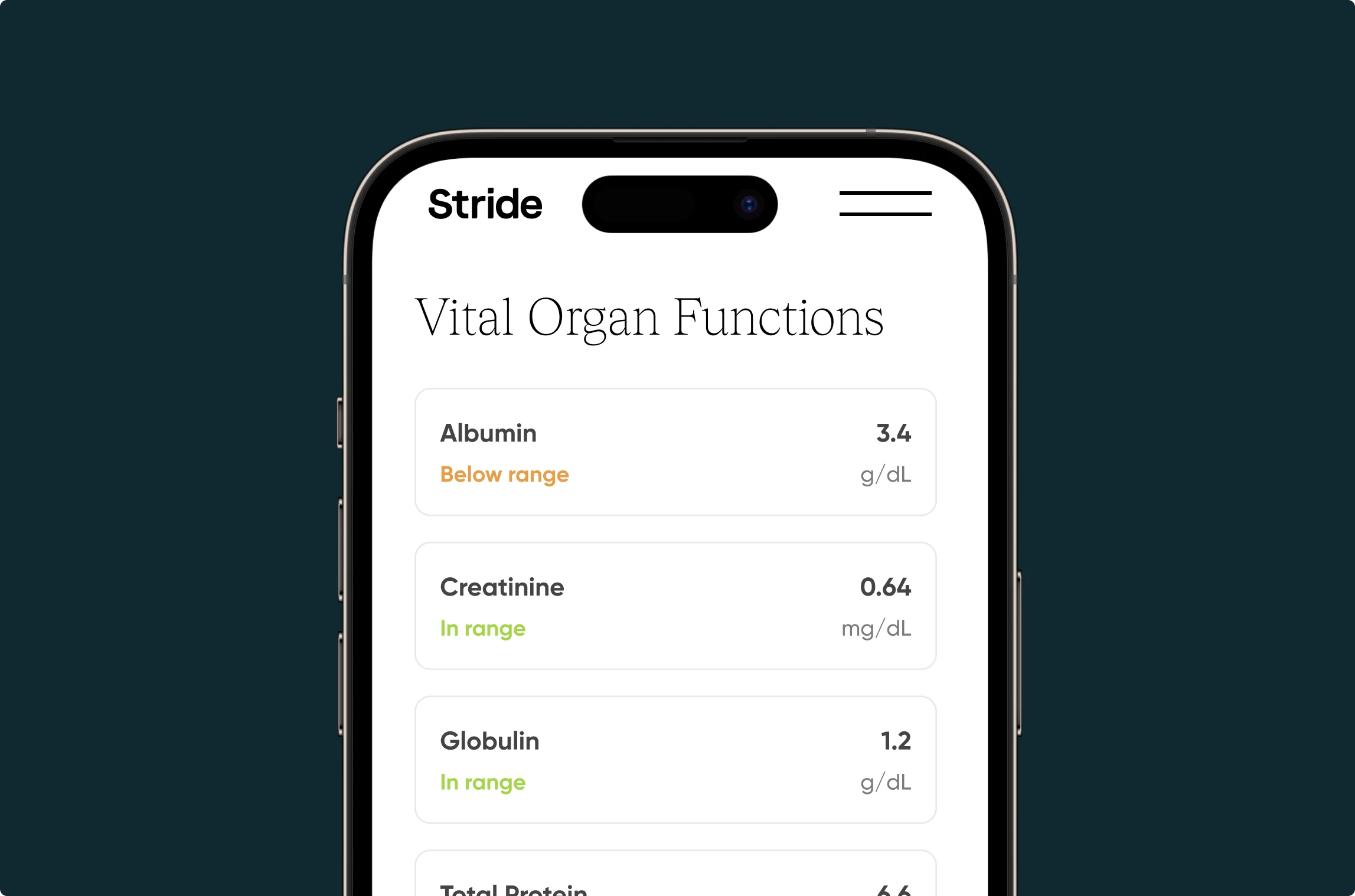
Blood Health Markers
The Blood Health panel provides a comprehensive analysis of your blood cells and composition, offering insights into oxygen transport, immune function, and clotting abilities. These markers help evaluate overall health status, detect potential infections or inflammation, and screen for blood disorders before symptoms become apparent.
With this detailed blood profile, you can better understand your body's immune response, identify nutritional impacts on blood health, and track improvements over time as you implement health-optimising strategies.
Basophils (count and %)
A type of white blood cell involved in allergic responses.
Why measure? Helps evaluate allergic conditions and detect certain rare blood disorders.
Eosinophils (count and %)
White blood cells that fight parasitic infections and participate in allergic responses.
Why measure? Elevated levels can indicate allergies, parasitic infections, or certain autoimmune conditions.
Haematocrit
The percentage of red blood cells in the blood.
Why measure? Helps assess hydration status and screen for conditions affecting red blood cell production.
Haemoglobin
The oxygen-carrying protein in red blood cells.
Why measure? Evaluates oxygen-carrying capacity and screens for anaemia, which can cause fatigue and reduced performance.
Lymphocytes (count and %)
White blood cells essential for immune function.
Why measure? Provides insights into immune system health, with abnormal levels potentially indicating infection or immune system disorders.
Mean Corpuscular Haemoglobin (MCH)
The average amount of haemoglobin per red blood cell.
Why measure? Helps characterise types of anaemia and evaluate overall red blood cell health.
Mean Corpuscular Haemoglobin Concentration (MCHC)
The average concentration of haemoglobin inside red blood cells.
Why measure? Assists in classifying different types of anaemia and red blood cell disorders.
Mean Corpuscular Volume (MCV)
Measures the average size of red blood cells.
Why measure? Helps distinguish between different types of anaemia and assess nutritional status/deficiencies including B12 and folate.
Monocytes (count and %)
A type of white blood cell that fights bacteria and helps with tissue repair.
Why measure? Abnormal levels can indicate infection, inflammation, or certain blood disorders.
Mean Platelet Volume (MPV)
The average size of platelets in the blood.
Why measure? Can indicate platelet production rate and bone marrow activity, with implications for cardiovascular and inflammatory conditions.
Neutrophils (count and %)
The most abundant type of white blood cell, which fights bacterial infections.
Why measure? Important for evaluating immune function and detecting infection or inflammation.
Platelets
Cell fragments essential for blood clotting.
Why measure? Screens for bleeding disorders or clotting risks and provides information about bone marrow function and is a risk factor for cardiovascular diseases.
Red Cell Distribution Width (RDW)
Measures the variation in size of red blood cells.
Why measure? Assists in diagnosing different types of anaemia and has been linked to overall health status and mortality risk.
Red Blood Cell Count
The total number of red blood cells per volume of blood.
Why measure? Helps assess oxygen-carrying capacity and screen for conditions affecting red blood cell production or survival.
White Blood Cell Count
The total number of white blood cells in your blood.
Why measure? Provides an overview of immune system activity, with elevated levels often indicating infection or inflammation.
See More
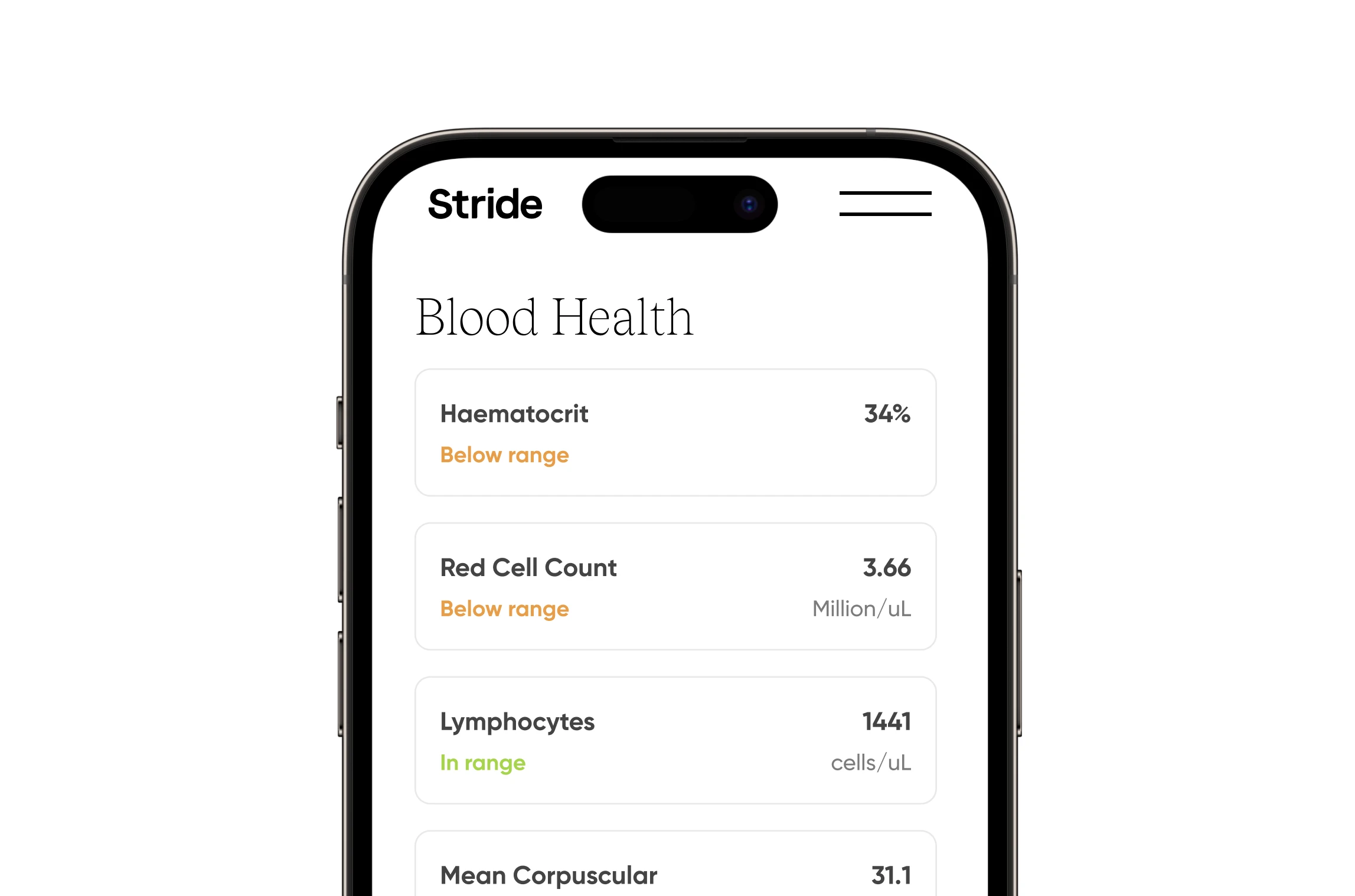
Methylation & Longevity Markers
The Methylation & Longevity panel synthesises data from key biomarkers across multiple testing categories to evaluate factors that influence healthy ageing and longevity. The analysis draws from select cardiometabolic, hormone, nutritional, and organ function markers to create a comprehensive health optimisation profile.
With this integrated assessment, you can implement personalised lifestyle strategies to support cellular health and improve your overall healthspan, tracking improvements across these interconnected systems with regular blood testing.
Active B12
The biologically active form of vitamin B12.
Why measure? Works with folate in methylation pathways, influencing energy production, neurological health, and cellular repair mechanisms.
Cortisol
The primary stress hormone.
Why measure? Chronic stress affects methylation patterns and can accelerate cellular ageing processes.
D.H.E.A. Sulphate
An adrenal hormone that declines predictably with age.
Why measure? Associated with methylation efficiency and overall longevity potential.
Folate (Vitamin B9)
Circulating levels of folate (B9), a critical methyl donor.
Why measure? Essential for methylation processes, DNA synthesis, and repair. Optimal levels support cellular health and longevity.
FT3 (Free Triiodothyronine)
The unbound, biologically active form of T3, the most potent thyroid hormone.
Why measure? Essential for cellular energy production and metabolic regulation, which influence methylation efficiency and cellular ageing processes.
HbA1c
Measures your average blood glucose over the past 2-3 months.
Why measure? Glycation damages proteins through non-enzymatic processes that compete with methylation pathways, affecting cellular ageing and longevity.
hsCRP (High-sensitivity C-reactive protein)
Low-grade inflammation throughout your body.
Why measure? Chronic inflammation alters methylation patterns and accelerates ageing processes.
T4 (Thyroxine)
The main hormone produced by the thyroid gland.
Why measure? Impacts overall metabolic rate and energy regulation, affecting methylation efficiency and cellular health.
TSH (Thyroid Stimulating Hormone)
A pituitary hormone that regulates thyroid function.
Why measure? Thyroid regulation influences methylation-dependent metabolic processes and cellular ageing patterns.
Vitamin D
Circulating levels of vitamin D.
Why measure? Influences gene expression through epigenetic mechanisms related to methylation and is associated with longevity.
See More
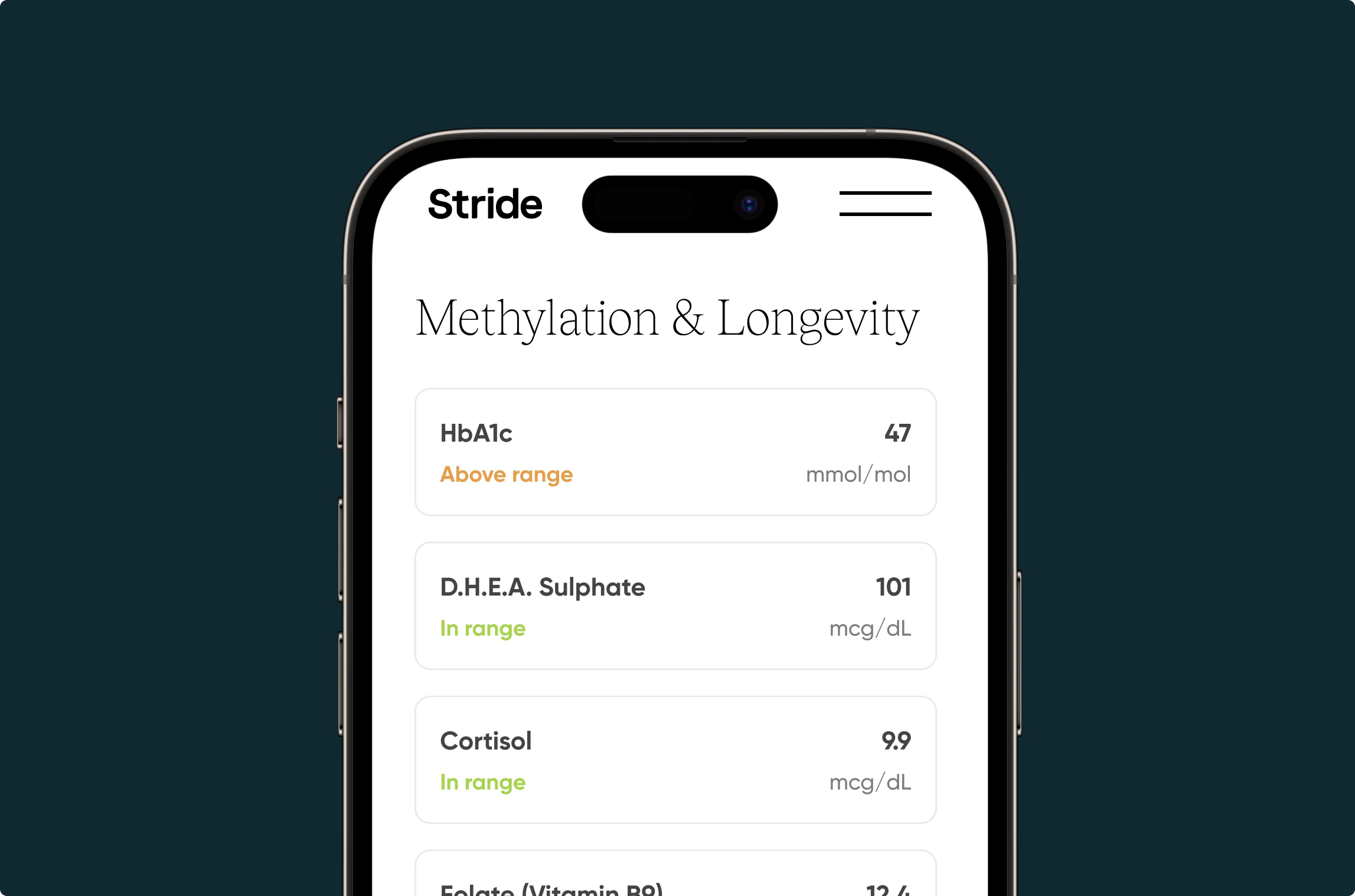
MyStride: Your home for everything health
Experience a new way to track and optimise your health with MyStride. Our intuitive platform brings together all your test results, personalised advice, and supplement recommendations. Access your health dashboard, track your progress, and stay connected with our team - anytime, anywhere.
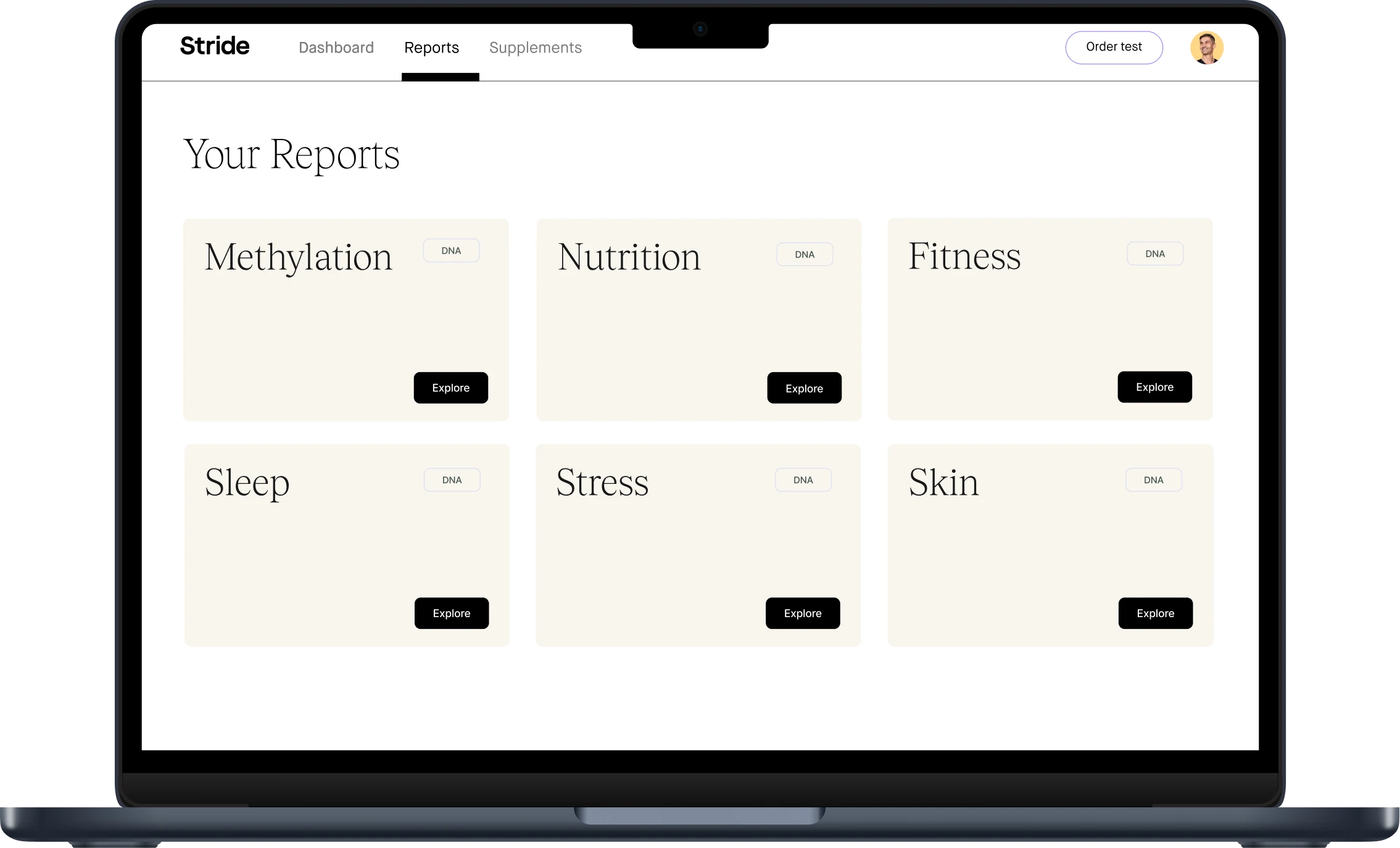
Professional phlebotomy service
StrideBloods includes a convenient, professional blood collection service:
Nationwide coverage
Available throughout the entire UK
Flexible scheduling
Appointments at your home or workplace at times that suit you
Zero preparation
Our phlebotomists bring all equipment and handle sample shipping to the lab
Quality assured
CQC regulated service with UKAS accredited laboratory testing
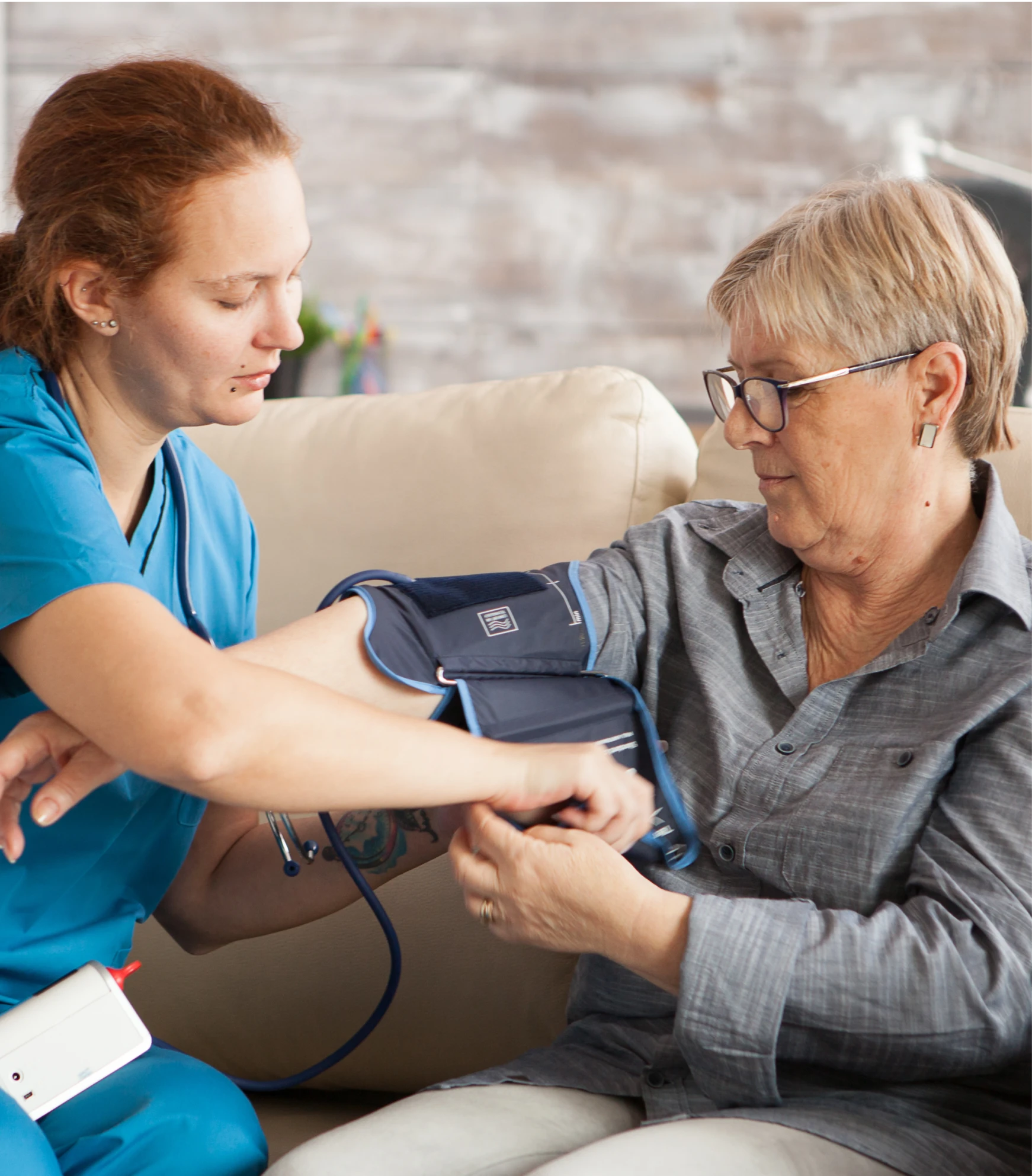
Explore our other products
StrideDNA

At-home DNA test unlocking 45+ reports on methylation profile, nutrition, fitness, sleep, stress, and skin.
Explore StrideDNAStrideBiome
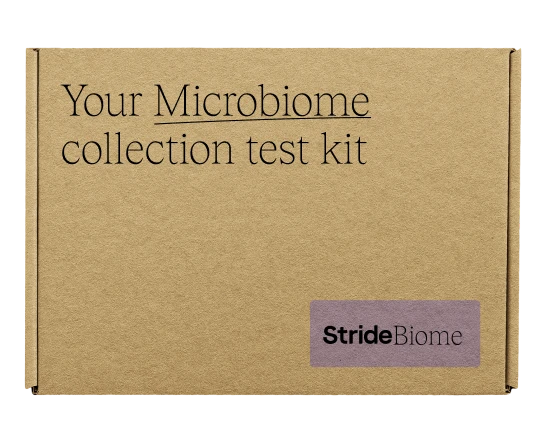
At-home gut health test revealing microbiome diversity, gut-brain connection, and digestion insights.
Explore StrideDNAStrideBioage
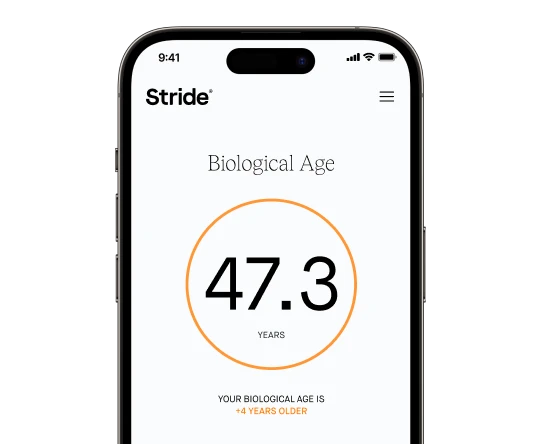
Advanced epigenetic testing revealing biological age, stress impact, and personalised lifestyle optimisations.
Explore StrideBioageStrideDaily
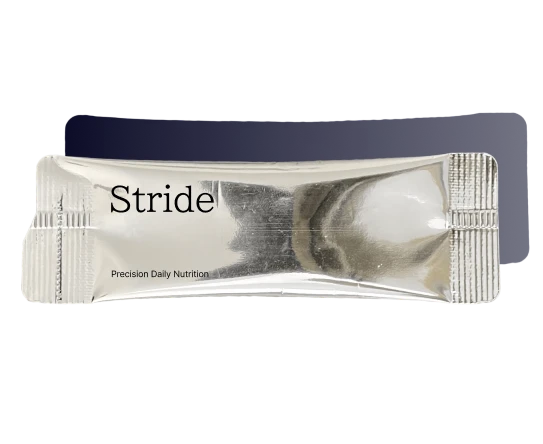
Liposomal liquid multivitamin tailored to your biomarkers and health goals.
Explore StrideDailyFor the curious.
What is StrideBloods?
StrideBloods is a comprehensive blood testing service in the UK that analyses over 70 essential biomarkers to provide a detailed snapshot of your current health status. Through professional, at-home phlebotomy blood draws, advanced laboratory analysis and swift results, StrideBloods helps you make informed decisions about your health based on objective data rather than generic advice.
What biomarkers does StrideBloods measure?
StrideBloods evaluates six key areas of health: cardiometabolic function (including heart, cholesterol and blood sugar markers), hormonal balance (including thyroid and sex hormones), vital organ performance (liver and kidney function), nutritional status (vitamins and minerals), blood health (red and white blood cells), and methylation/longevity markers.
Do I need any equipment for my appointment?
No, you don't need to provide any equipment. Our qualified phlebotomist brings everything needed for your blood draw, including collection tubes, needles, and sanitising equipment. You only need to be present and we recommend that you are well-hydrated.
Do phlebotomists travel throughout the UK?
Yes, our network of certified phlebotomists covers the entire UK (including the Scottish Highlands!). We coordinate appointments based on your location to ensure a convenient, at-home service regardless of where you live.
When will my results be ready?
Your comprehensive blood test results will be available within 7 days from your at-home blood draw. You'll receive an email notification when your results are ready to view on our secure digital platform, My Stride.
Can I get morning or evening phlebotomy slots?
Our nurse network has morning, afternoon, and evening availability to accommodate different schedules. Availability differs slightly by region, but our team will always try to accommodate your preferred time slot.
How should I prepare for my blood test?
We'll email you with specific preparation instructions prior to your appointment. Most tests require fasting for 8-12 hours (water is permitted), but preparation requirements may vary depending on the specific markers being tested. Our email will include all necessary instructions to ensure the most accurate results.
Is the blood draw painful?
Most people experience only minimal discomfort during the blood draw. Our professional phlebotomists are highly trained to make the process as quick and comfortable as possible.
How long does the appointment take?
The entire process usually takes about 15-20 minutes, including preparation, the blood draw itself, and aftercare instructions.
What happens after I receive my results?
Once your results are available, you can review them on the MyStride portal. Each biomarker includes clear explanations and recommendations.
How often should I get tested?
We recommend re-testing every 6 months to track meaningful changes over time. This allows you to monitor the effectiveness of any lifestyle modifications and ensure you're making progress towards optimising your health
What if my results show abnormal values?
If any of your results fall outside the normal range, we will clearly indicate this and provide context about what it might mean. For significant abnormalities, we recommend sharing your results with your GP for further evaluation.
Is my data secure and confidential?
Absolutely. All your personal information and test results are protected by strict confidentiality protocols and industry-leading security measures. Your data is never shared with third parties without your explicit consent.
Can I combine StrideBloods with StrideDNA for more comprehensive insights?
Yes! Combining StrideBloods with our StrideDNA testing provides a powerful combination of current health status and genetic predispositions. This comprehensive approach allows for truly personalised health recommendations based on both your genetics and current biomarkers.










